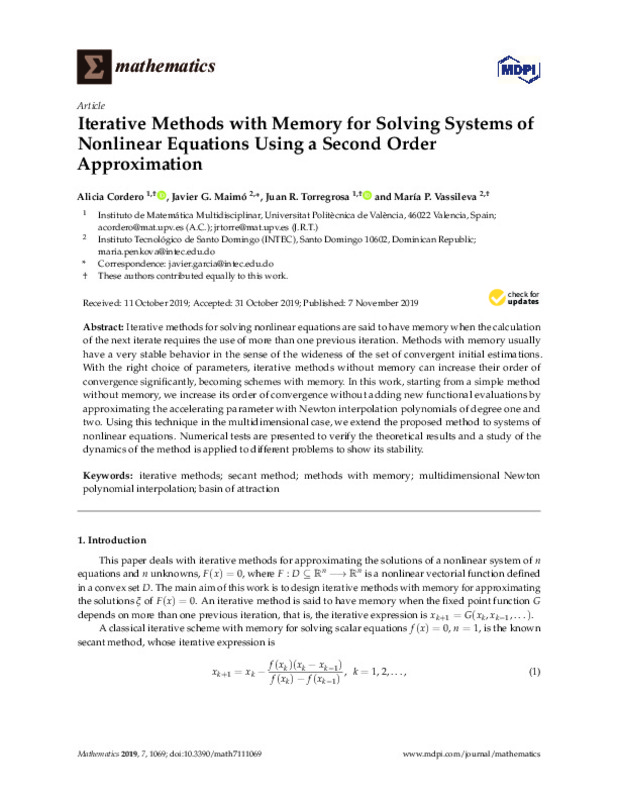JavaScript is disabled for your browser. Some features of this site may not work without it.
Buscar en RiuNet
Listar
Mi cuenta
Estadísticas
Ayuda RiuNet
Admin. UPV
Iterative methods with memory for solving systems of nonlinear equations using a second order approximation
Mostrar el registro sencillo del ítem
Ficheros en el ítem
| dc.contributor.author | Cordero Barbero, Alicia
|
es_ES |
| dc.contributor.author | Maimó, Javier G.
|
es_ES |
| dc.contributor.author | Torregrosa Sánchez, Juan Ramón
|
es_ES |
| dc.contributor.author | Vassileva, María P.
|
es_ES |
| dc.date.accessioned | 2021-01-19T04:32:24Z | |
| dc.date.available | 2021-01-19T04:32:24Z | |
| dc.date.issued | 2019-11 | es_ES |
| dc.identifier.uri | http://hdl.handle.net/10251/159353 | |
| dc.description.abstract | [EN] Iterative methods for solving nonlinear equations are said to have memory when the calculation of the next iterate requires the use of more than one previous iteration. Methods with memory usually have a very stable behavior in the sense of the wideness of the set of convergent initial estimations. With the right choice of parameters, iterative methods without memory can increase their order of convergence significantly, becoming schemes with memory. In this work, starting from a simple method without memory, we increase its order of convergence without adding new functional evaluations by approximating the accelerating parameter with Newton interpolation polynomials of degree one and two. Using this technique in the multidimensional case, we extend the proposed method to systems of nonlinear equations. Numerical tests are presented to verify the theoretical results and a study of the dynamics of the method is applied to different problems to show its stability. | es_ES |
| dc.description.sponsorship | This research was supported by PGC2018-095896-B-C22 (MCIU/AEI/FEDER, UE), Generalitat Valenciana PROMETEO/2016/089, and FONDOCYT 2016-2017-212 Republica Dominicana. | es_ES |
| dc.language | Inglés | es_ES |
| dc.publisher | MDPI AG | es_ES |
| dc.relation.ispartof | Mathematics | es_ES |
| dc.rights | Reconocimiento (by) | es_ES |
| dc.subject | Iterative methods | es_ES |
| dc.subject | Secant method | es_ES |
| dc.subject | Methods with memory | es_ES |
| dc.subject | Multidimensional Newton polynomial interpolation | es_ES |
| dc.subject | Basin of attraction | es_ES |
| dc.subject.classification | MATEMATICA APLICADA | es_ES |
| dc.title | Iterative methods with memory for solving systems of nonlinear equations using a second order approximation | es_ES |
| dc.type | Artículo | es_ES |
| dc.identifier.doi | 10.3390/math7111069 | es_ES |
| dc.relation.projectID | info:eu-repo/grantAgreement/FONDOCYT//2016-2017-212/ | es_ES |
| dc.relation.projectID | info:eu-repo/grantAgreement/GVA//PROMETEO%2F2016%2F089/ES/Resolución de ecuaciones y sistemas no lineales mediante técnicas iterativas: análisis dinámico y aplicaciones/ | es_ES |
| dc.relation.projectID | info:eu-repo/grantAgreement/AEI/Plan Estatal de Investigación Científica y Técnica y de Innovación 2017-2020/PGC2018-095896-B-C22/ES/DISEÑO, ANALISIS Y ESTABILIDAD DE PROCESOS ITERATIVOS APLICADOS A LAS ECUACIONES INTEGRALES Y MATRICIALES Y A LA COMUNICACION AEROESPACIAL/ | es_ES |
| dc.rights.accessRights | Abierto | es_ES |
| dc.contributor.affiliation | Universitat Politècnica de València. Departamento de Matemática Aplicada - Departament de Matemàtica Aplicada | es_ES |
| dc.description.bibliographicCitation | Cordero Barbero, A.; Maimó, JG.; Torregrosa Sánchez, JR.; Vassileva, MP. (2019). Iterative methods with memory for solving systems of nonlinear equations using a second order approximation. Mathematics. 7(11):1-12. https://doi.org/10.3390/math7111069 | es_ES |
| dc.description.accrualMethod | S | es_ES |
| dc.relation.publisherversion | https://doi.org/10.3390/math7111069 | es_ES |
| dc.description.upvformatpinicio | 1 | es_ES |
| dc.description.upvformatpfin | 12 | es_ES |
| dc.type.version | info:eu-repo/semantics/publishedVersion | es_ES |
| dc.description.volume | 7 | es_ES |
| dc.description.issue | 11 | es_ES |
| dc.identifier.eissn | 2227-7390 | es_ES |
| dc.relation.pasarela | S\399246 | es_ES |
| dc.contributor.funder | Generalitat Valenciana | es_ES |
| dc.contributor.funder | Agencia Estatal de Investigación | es_ES |
| dc.contributor.funder | European Regional Development Fund | es_ES |
| dc.contributor.funder | Fondo Nacional de Innovación y Desarrollo Científico y Tecnológico, República Dominicana | es_ES |
| dc.description.references | Soleymani, F., Lotfi, T., Tavakoli, E., & Khaksar Haghani, F. (2015). Several iterative methods with memory using self-accelerators. Applied Mathematics and Computation, 254, 452-458. doi:10.1016/j.amc.2015.01.045 | es_ES |
| dc.description.references | Petković, M. S., & Sharma, J. R. (2015). On some efficient derivative-free iterative methods with memory for solving systems of nonlinear equations. Numerical Algorithms, 71(2), 457-474. doi:10.1007/s11075-015-0003-9 | es_ES |
| dc.description.references | Narang, M., Bhatia, S., Alshomrani, A. S., & Kanwar, V. (2019). General efficient class of Steffensen type methods with memory for solving systems of nonlinear equations. Journal of Computational and Applied Mathematics, 352, 23-39. doi:10.1016/j.cam.2018.10.048 | es_ES |
| dc.description.references | Potra, F. A. (1982). An error analysis for the secant method. Numerische Mathematik, 38(3), 427-445. doi:10.1007/bf01396443 | es_ES |
| dc.description.references | Fatou, P. (1919). Sur les équations fonctionnelles. Bulletin de la Société mathématique de France, 2, 161-271. doi:10.24033/bsmf.998 | es_ES |
| dc.description.references | Cordero, A., & Torregrosa, J. R. (2007). Variants of Newton’s Method using fifth-order quadrature formulas. Applied Mathematics and Computation, 190(1), 686-698. doi:10.1016/j.amc.2007.01.062 | es_ES |
| dc.description.references | Campos, B., Cordero, A., Torregrosa, J. R., & Vindel, P. (2015). A multidimensional dynamical approach to iterative methods with memory. Applied Mathematics and Computation, 271, 701-715. doi:10.1016/j.amc.2015.09.056 | es_ES |
| dc.description.references | Chicharro, F. I., Cordero, A., & Torregrosa, J. R. (2013). Drawing Dynamical and Parameters Planes of Iterative Families and Methods. The Scientific World Journal, 2013, 1-11. doi:10.1155/2013/780153 | es_ES |








